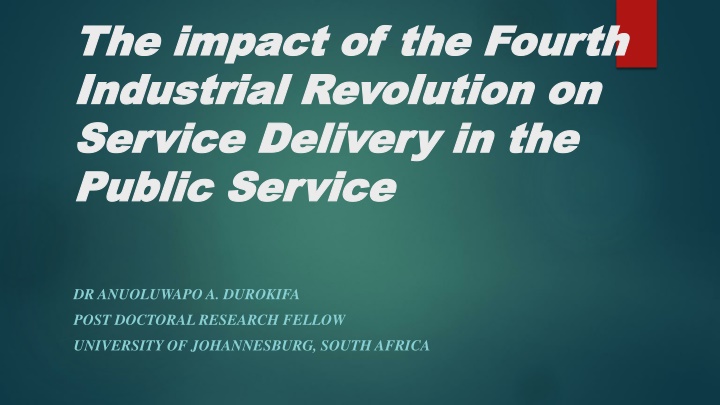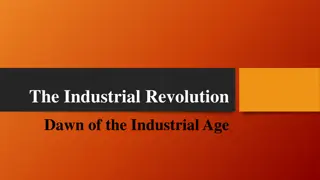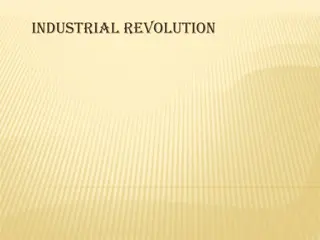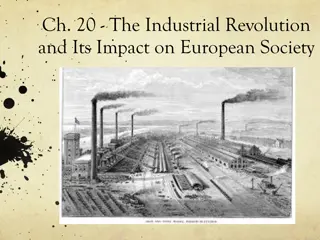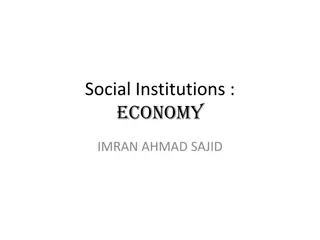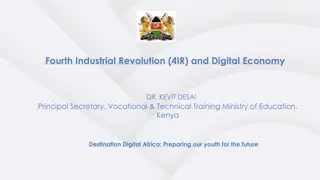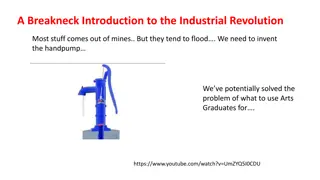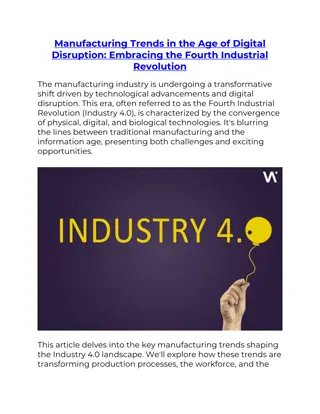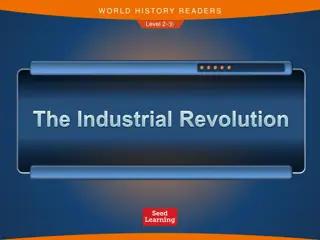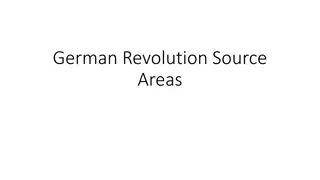The Impact of the Fourth Industrial Revolution on Service Delivery in the Public Service
Public service plays a vital role in society, with the Fourth Industrial Revolution (4IR) bringing significant changes. This revolution, characterized by rapid technological advancements, is reshaping how services are delivered in South Africa and globally. The fusion of digital, biological, and other technological spheres is altering governance and societal norms. The evolution of 4IR brings both challenges and opportunities to enhance service delivery in areas such as government, education, and healthcare.
Download Presentation

Please find below an Image/Link to download the presentation.
The content on the website is provided AS IS for your information and personal use only. It may not be sold, licensed, or shared on other websites without obtaining consent from the author.If you encounter any issues during the download, it is possible that the publisher has removed the file from their server.
You are allowed to download the files provided on this website for personal or commercial use, subject to the condition that they are used lawfully. All files are the property of their respective owners.
The content on the website is provided AS IS for your information and personal use only. It may not be sold, licensed, or shared on other websites without obtaining consent from the author.
E N D
Presentation Transcript
The impact of the Fourth The impact of the Fourth Industrial Revolution on Industrial Revolution on Service Delivery in the Service Delivery in the Public Service Public Service DR ANUOLUWAPO A. DUROKIFA POST DOCTORAL RESEARCH FELLOW UNIVERSITY OF JOHANNESBURG, SOUTH AFRICA
Presentation Outline Introduction The fourth industrial Revolution (4th IR) Service delivery in South Africa Covid 19: A catalyst to 4thIR Effects of 4thIR on Service Delivery Concluding Remarks
Introduction Public service carries out an important mandate in the society. They are the fulcrum to which government s work are seen and made accessible to the citizens. In South Africa, the 1996 constitution, sec 195 clearly spelt out the modus operandi of what is expected of the public service. Public service must evolve and not be stagnant. They must be adaptable to changes for the betterment of the society. At present, the world is on the cusp of another industrial revolution where the fusion of technologies is blurring the lines between the physical, digital, biological and neuro-technological spheres (Cronje, 2016; Dlamini, 2016) The fast pace of digitization termed as fourth industrial revolution has began to affect governance, government and the society.
What is Fourth Industrial Revolution? Fourth industrial revolution did not just spring up it evolved. The fourth industrial revolution is a technological beast, progressing at a quicker and rapid pace than any of the previous three revolutions (Badimo, 2018; Satyam and Keleher 2018) The 4IR has built an environment of its own and trends such as the Internet of Things (IOT), robotics, mobile, supercomputing, and artificial intelligence. 4IR has changed how we live, work and communicate, and is re- shaping basic sectors of the society such as government, education, health, and labour, and more importantly, delivery of services. Ironically, it has created doubts especially as a mean to take over human prowess
Fourth Industrial Revolution contd. Scholars (Cann, 2016; Prisecau, 2016; Schwaib, 2016) have averred that 4IR will transform the labour market by paving way for job loss, thereby increasing the unemployment rate. For example, in the first half of 2019, Standard Bank of South Africa closed 104 of its branches as opposed to the 91 it made mention of early in the year (Bond, 2019; Mahlokwane, 2019) Yet, the 4IR has ushered in innovative technologies that can help governments serve their citizens better
Service delivery in South Africa Service delivery in context. .The distribution of basic resources citizens depend on like water, electricity, sanitation, infrastructure, land, and housing (Chen, Dean, Frant and Kumar, 2014:1) A bridge in the distribution of equitable service delivery. For example, in 2009, the municipal service delivery was in a crisis. Nationally 46% (5.7 million) of households did not have universal access to water, sanitation, refuse removal and electricity(PSA, 2015).
Service delivery in South Africa Contd In 2015, the trajectory has changed to include employment and security. According to a study conducted in 2015 by the HSRC s South African Social Attitudes Survey (SASAS), 78% of respondents identified unemployment as a service delivery hitch, followed by insecurity (46% of the respondents), then the common service delivery expectations like water, electricity and housing (25% of the respondents) The hiccups indicating challenges and producing mean results in form of protests, exhibiting violence, etc.
Covid 19: A catalyst to 4thIR The end of 2019/2020 marked an indelible global change. The corona virus was detected with no cure in view and its swift spread across countries. Stringent measures were implemented and fundamental changes made to how we live, work , play and conduct businesses. As well as change the norms in policymaking, legislation, and sectors such as health and education. The 4thIR appeared as a saviour negating the oft-quoted detriment of the 4thIR as a force for disruption, inequality, and a threat to the livelihood of people as humans are being replaced with machines.
Covid 19: A catalyst to 4thIR Contd The pandemic has compelled the world to consider structural shift on how we live, work and relate thereby blurring the boundaries between the physical, digital and biological world. The pandemic situation has driven people to be more reliant on digital and biological technologies as well as how these technologies can create value in new ways. In other words, there are more online activities as the intervention of digital technologies aid the continual flow of businesses, activities, and human interaction. For instance, Rwanda deployed robots to hospitals to reduce health workers contacts with COVID-19 patients and minimizing their risk of infections (DPA, 2020).
Covid 19: A catalyst to 4thIR Contd Artificial-intelligence based thermal imaging cameras are used in China to scan public spaces to identify potential sick people. In Saudi Arabia, Honduras, China, Spain, and the UAE, drones have been used to disinfect public spaces (Ibrahim, 2020).In some parts of China, Australia, and the USA, drones have been used to deliver groceries (Ibrahim, ibid) In Schools, students are shifting towards remote e-learning. According to the World Economic Forum (2020), over 1.2 billion around the world have been out of classrooms due to the pandemic. Thus, leading to a distinctive rise of remote e-learning using digital platforms. In the health care sector, low-cost gene sequencing technologies are used to track coronavirus as well as a promising vaccine candidate (Finley, 2020)
Covid 19: A catalyst to 4thIR Contd Digital applications such as Zoom, Microsoft Teams, WhatsApp, and Skype has become the primary means of co-working People have been able to retain their jobs and businesses kept afloat because of e-commerce. According to statistics, 16% of South Africans are shopping more online than they do before since the strict lockdown of the 27thof March, 2020 (Korsten, 2020).
Effects of 4thIR on Service Delivery The 4thIR offers huge potential to transform the public service delivery processes globally. Countries like China, US, UK, South Korea are maximizing offshoot of the 4thIR to effectively provide services for their citizens. In Africa, countries like Uganda and Rwanda has stemmed on the 4thIR. For instance, Rwanda was the first country to incorporate drones into its health care system, using autonomous air vehicles to deliver blood to remote regions. In South Africa, the public service is standing at an important moment of technology with service delivery been realigned to fit its service delivery processes.
Effects of 4thIR on Service Delivery Like a coin, there are two sides. The pros and the cons which can be worked on. The Pros: Swift delivery of services: For instance, hospitals in South Africa have become more equipped with e filing for there to be a swift process for in and outpatients. Also, to enable doctors, lab-technicians and other necessary personnel be able to access results. 1. Transparency and Accountability: An open book putting municipalities to check especially in terms of public finance and disbursement of services rightly and timely to citizens. 2. Reducing the cost of accessing services 3.
4. Making services accessible and available Cons: Reduce job opportunities Privacy breach Security breach 1. 2. 3.
Concluding Remarks The pandemic has led to an unavoidable embrace of the 4thIR as digital solutions are rising to save the day. What was regarded to as a wait in the wing in South Africa has become solution provider to restore many parts of our daily lives and in helping us to navigate through service delivery. However, despite the embracement of digital transformation, many people are still left behind due to the digital divide that exists especially for people with low income and those that lives in remote areas. In all, the embrace of technology is inevitable. Thus, solutions be found to concerns such as privacy and data breach, as well as digital divide. While fostering an equitable service delivery.
References Badimo, H. (2018), The Impact of the Fourth Industrial Revolution on Public Service Delivery. https://www.linkedin.com/pulse/impact- fourthindustrial-revolution-public-service-delivery-badimo/ June 14 {Accessed 3rd July 2019} Cann, O., 2016, Five Million Jobs by 2020: the Real Challenge of the Fourth Industrial Revolution https://www.weforum.org/press/2016/01/five-million-jobs-by-2020- the-real-challenge-of-the-fourth-industrialrevolution Cronj , J., 2016. The digital economy and policy implications for trade, Stellenbosch, Western Cape: TRALAC Dlamini, K., 2016. SA must plan for new industrial revolution, Johannesburg: Sunday Times [Opinion].
Mahlokwane, J., 2019, Shock, sympathy and criticism as Standard bank closes 104 branches , viewed 02 January 2020, from https://www.iol.co.za/pretoria-news/shock-sympathy-and-criticism-as- standardbank-closes-104-branches-24988984 Prisecau, P, 2016, Challenges of the Fourth Industrial Revolution , Knowledge Horizons Economics, 8(1): 57 62. Satyam, A and Keleher, H. (2018), How will the Fourth Industrial Revolution Transform how we Govern? https://blogs.cisco.com/government/how-will-the-fourth- industrialrevolution-transform-ho w-we-govern December 18 {Accessed 3rd July 2019}. Schwab, K., 2016, The Fourth Industrial Revolution, The World EconomicForum, viewed 14 July 2019 from http://www.weforum.org/pages/the-fourthindustrial-revolution-by-klaus- schwab.
